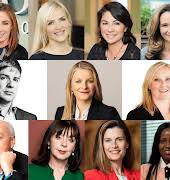
By Jennifer McShane
23rd Oct 2017
23rd Oct 2017
Businesswomen in 2017 have a lot to contend with, from the smooth running of their companies to trying to shatter glass ceilings and dealing with gender discrimination and sexism in the workplace. That’s an awful lot of items to tick off a checklist even before they get to grasps with trying to be “likeable” – yet another term that is associated with successful women in a predominantly negative manner.
It’s well known that success and likeability are positively correlated for men and negatively correlated for women. The higher on the corporate ladder a woman climbs, the less likeable she is perceived to be. In the case of a man, the opposite holds true. Just look at Hillary Clinton. In her series of presidential debates, the focus was less on her capabilities as a candidate for the first ever female president of the United States and more on the fact that she should smile more. In fact, the consensus is that Clinton is rather unlikeable despite the fact that she has achieved a tremendous amount over her successful, decades-long career. In contrast, her husband Bill, despite his very public past mistakes is still considered hugely popular and charismatic by many a US media publication. The same is usually befitting of any female in the public eye. Take Oscar winner and actress, Anne Hathaway. She’s hugely successful and undoubtedly able to run her own empire, yet articles still get written with titles such as: ‘Why does everyone hate Anne Hathaway?‘ Anna Wintour? The words “Ice Queen” tend to come before any paragraph written about her influence on the fashion industry.

So why should any woman who is striding up the career ladder even have to think about if they are liked by the masses?
Ahead of our IMAGE Businesswomen of the Year Awards 2017 on November 20th, we asked some of our previous winners about whether or not they felt the likeability pressure:
Yes, the pressure to not only be likeable but to appear as if you have it all – brains, beauty and brawn while you effortlessly balance career with family life is immense. I am very fortunate that my natural disposition is to be kind to people no matter how and where our interaction takes place, on either a personal or professional level. My experience coming from a large family and in developing my career has taught me that you never lose when you are kind and more often than not luck will favour those who channel positivity. People work with people, and you are much more likely to choose to work for and with people you like and respect. Being kind costs nothing and has the power to not only influence your own state of mind but also the outlook of all those around you – Sandra McKenna, co-founder, Sheology Digital
I think it’s an innate personal trait in everyone, male and female, to want to be liked or likeable. However, in business, my preference would be on being respected. In a professional environment, especially for women in many male orientated industries, gaining respect is more difficult – it has to be earned from not being good, but being exceptional at your job. It is the validation and confirmation from your peers, managers, employees and clients that you are doing your job correctly. – Fiona Flannery, CEO, DEPFA Bank plc
I think no matter your gender you have to be a good person, likeable or not likeable are nonsense terms and have nothing to do with the real world, what matters is being good. I think we’ve gone past the age of the Power Woman, a 1980s Margaret Thatcher cast off. But that doesn’t mean some women and men won’t still behave that way, our job as a society is to ignore them! – Chupi Sweetman-Durney, creative director, Chupi
My philosophy in life is to be yourself and the best you can (as opposed to concentrating on being likeable). For me, this is what is important. Bernadette Kinsella, CEO, worldBOX.ie
























